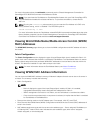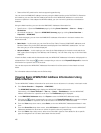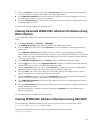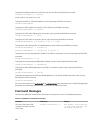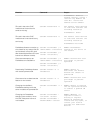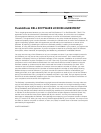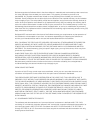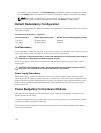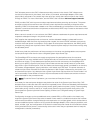
13
Managing Fabrics
The chassis supports a fabric type, which is Fabric A. Fabric A is used by the single I/O Module, and is
always connected to the on-board Ethernet adapters of the servers.
The chassis has only one I/O module (IOM), where the IOM is a pass-through or switch module. The I/O
Module is classified as group A.
Chassis IOM uses a discrete data path called Fabric, and it is named A. The Fabric A supports only
Ethernet. Each server IO adapter (Mezzanine Card or LOM) can have either two or four ports depending
on the capability. The mezzanine card slots are occupied by PCIe extension cards that are connected to
PCIe cards (and not to IO modules). When you deploy the Ethernet, iSCSI, or FibreChannel networks,
span their redundant links across banks one and two for maximum availability. The discrete IOM is
identified with a fabric identifier.
NOTE: In the CMC CLI, the IOM is referred to by the convention, switch.
Fresh Power-up Scenario
When the chassis is plugged in and turned on, the I/O module has priority over the servers. The IOM is
allowed to turn on before the others. At this time, verification of their fabric types is not performed.
After the IOMs turn on, the servers turn on, and then CMC verifies the servers for fabric consistency.
A pass-through module and switch are allowed in the same group if their fabric is identical. Switches and
pass-through modules can exist in the same group even if they are manufactured by different vendors.
Monitoring IOM Health
For information about monitoring IOM health, see Viewing Information and Health Status of the IOM.
Configuring Network Settings for IOM
You can specify the network settings for the interface used to manage the IOM. For Ethernet switches,
the out-of-band management port (IP address) is configured. The in-band management port (that is,
VLAN1) is not configured using this interface.
Before configuring the network settings for the IOM, make sure the IOM is turned on.
To configure the network setting of IOM in Group A, you must have the Fabric A Administrator privileges.
173



